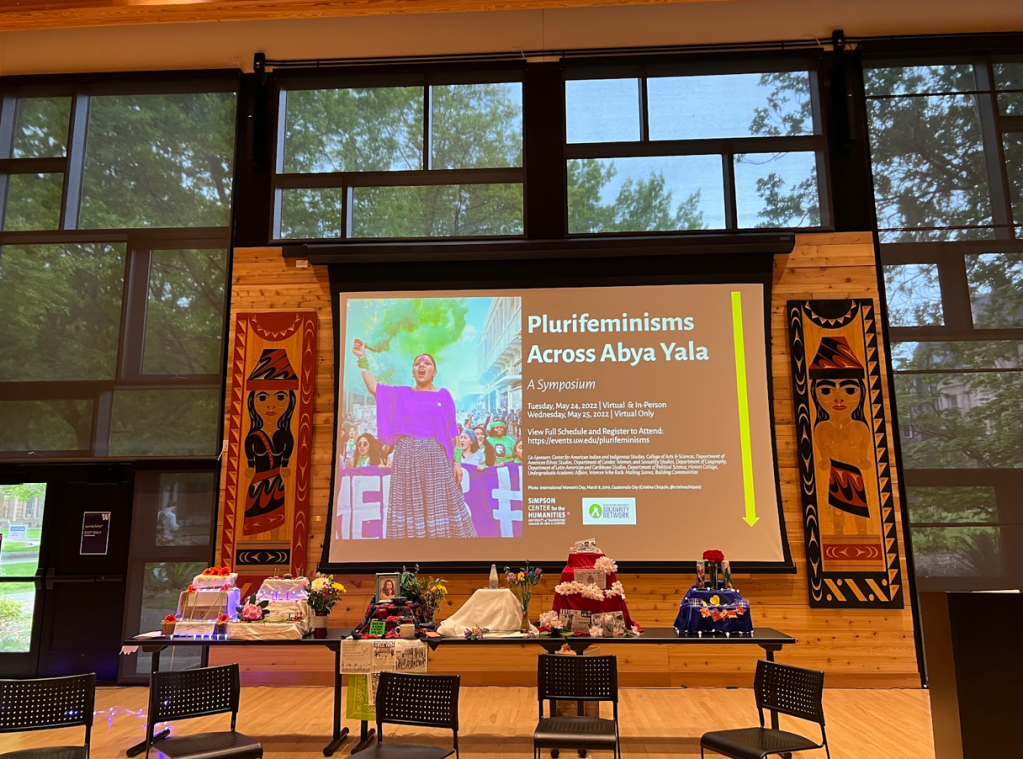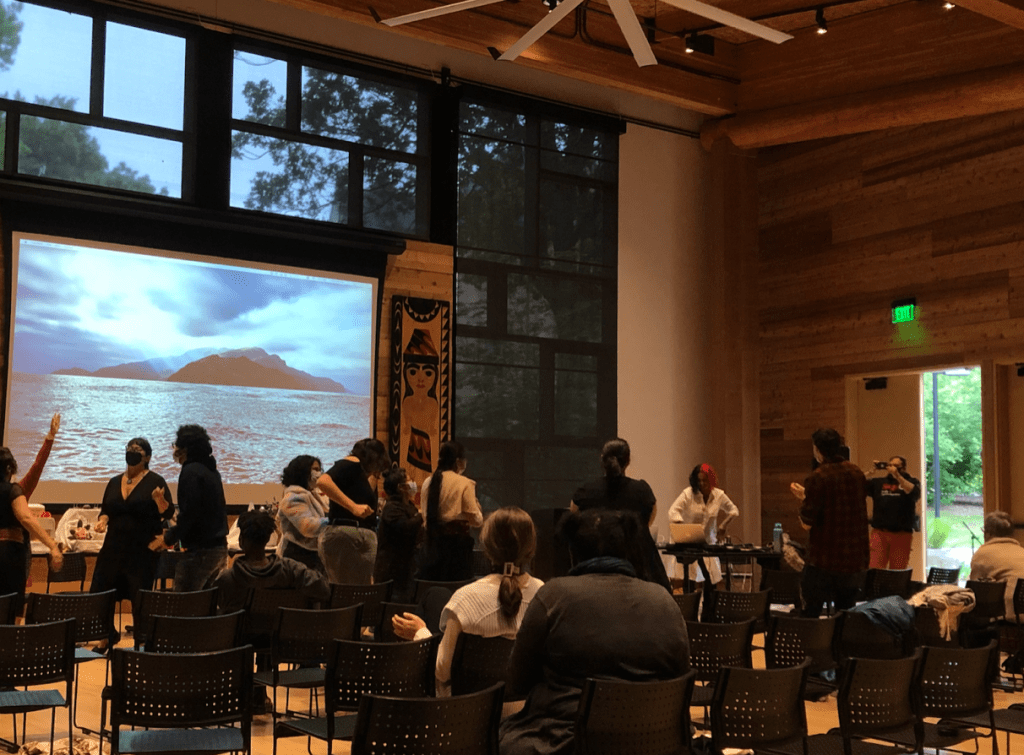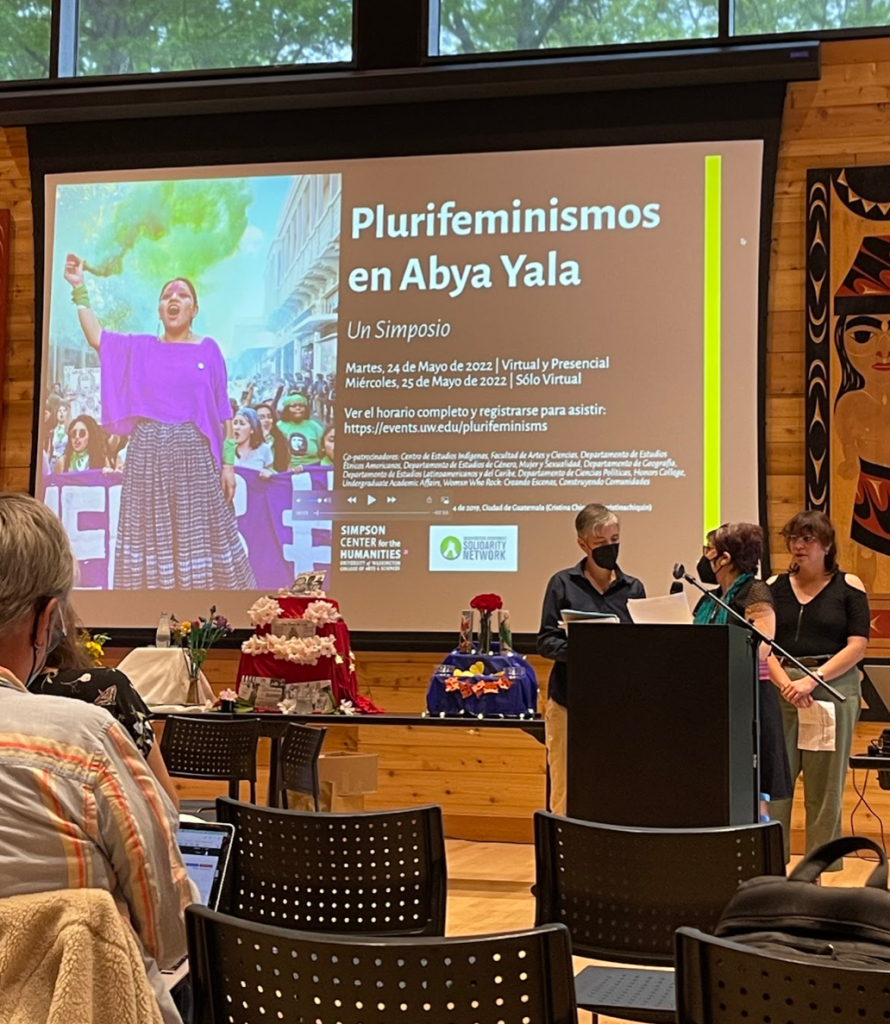Our Learning Experiences from the Encuentro and Working as a Group
- Shannon Hong: The encuentro and our group collective altar/ofrenda helped me learn how valuable collaborative thinking is. Although our group never got to work together in person, we found creative ideas to share our ideas virtually, whether that be through Zoom, Google Docs, or our group chat. This allowed us to come up with a unique theme for our altar/ofrenda, which celebrated working mothers. Such collaborative thinking was also emphasized in the encuentro, where people of all backgrounds came together to talk about plurifeminism in the same space and were willing to answer any questions my peers and I had. It was an honor to be a part of this event and I hope to apply what I learned in my future community-based work.
- Sadie Armstrong: From working as a group in preparation for the encuentro and from the encuentro itself, I was able to learn about the importance of communication. In the context of our group project, communication was imperative for the successful creation of our ofrenda and completion of miscellaneous assignments, especially due to the format of our class we were never able to collaborate in person. The encuentro showed me the value of good communication on a larger scale, as respectful communication both between panelists and between the panelists and the audience was crucial for the success of the event. While I have always valued effective communication in work such as this, working as a group and the encuentro provided great opportunities for me to strengthen this skill.
- Norma Gaspar: This group and the encuentro has helped me understand more about the ofrenda, plurifeminism, and the importance of convivencia. While we had some difficulties communicating online and where unable to work together or see each other in person, we somehow managed to get through it. Moreover, the conference itself was different that what I expected. At first, I didn’t know how to act considering it was the first time I ever participated in an event like this. However, everyone participating made it seem relaxing and the panelists where very approachable, made it easier for me to ask them questions and didn’t feel as nervous. I am glad I was able to form part of the event and group and I hope later on I can continue in convivencia with others!
- Amr Mansour: After working as a group, I was able to feel the importance of unity and how things can be accomplished in a smoother and quicker way when working with a group of people, especially with good communication. This group had really good communication and we were able to finish things in a timely manner. I will definitely continue to apply the skills from the encunetro to future jobs and projects.
- Ethan Lee: Throughout my time working in this group, I have gotten an understanding of how to unite and work as a team, with topics that we all were relatively not familiar with. However, through working together and collaborating with my group members I have learned so much, and also were able to come together and represent an issue regarding Chicana Feminism that our entire group was passionate about through our ofrenda. This process of working on this ofrenda has allowed me to learn more than I ever could have imagined, and has made me more comfortable and confident in my ability to extend my knowledge to diverse communities and also to express myself in my own diverse way.
Photos






Photo Selection, Metadata, Categorization
The photos above were selected to identify some of the important moments from the Plurifeminisms Across Abya Yala Symposium. Most of the photos selected show some sort of connection. Some of the pictures show Michelle Habell-Pallan, Maylei Blackwell, Black Mama, and Cristina Burneo are all individuals with unique identities and experiences, but through their shared connection to the goals of plurifeminism these people were drawn together and were able to form a community. We saw how the ofrendas in the background may look different but all are serving the same purpose. Towards the end of the event, we saw how the powerful lyrics of Black Mama brought individuals of all different backgrounds together in a celebration of culture and each other.
Photo 1
- Photo taken by Shannon Hong at the Feminisms Across the Abya Yala Symposium
- UW Intellectual House Seattle, WA – USA
- May 24, 2022
- Caption: Michelle Habell-Pallan leads the first panel of the event with Maylei Blackwell, Black Mama, and Cristina Burneo answering her questions.
- Category: Building Communities- Michelle Habell-Pallen, Maylei Blackwell, Black Mama, and Cristina Burneo are all individuals with unique identities and experiences, but through their shared connection to the goals of plurifeminism these people were drawn together and were able to form a community. This formation of community was able to occur for the same reason between the panelists and the audience.
Photo 2
- Photo taken by Shannon Hong at the Feminisms Across the Abya Yala Symposium
- UW Intellectual House Seattle, WA – USA
- May 24, 2022
- Caption: The group ofrendas are displayed with the event information shown on the screen. This represents the culmination of our work this quarter, as we were able to work in a team and collaborate on an ofrenda that represents what we learned from this course.
- Category: Making Scenes – This image represents Making Scenes because the ofrendas made by the different groups each serve as tribute to the groups and experiences we have discussed throughout the quarter. Each ofrenda is an individual scene, and together they highlight the important aspects of our class.
Photo 3
- Photo taken by Sadie Armstrong at the Feminisms Across the Abya Yala Symposium
- UW Intellectual House Seattle, WA – USA
- May 24, 2022
- Caption: At the end of Black Mama’s concert, many of the audience members stood up to dance together and celebrate the power of the music. The dancing can be seen as a symbol of unity.
- Category: Convivencia – Convivencia, or the deliberate act of being with each other as a community, is illustrated in the image above. Connected by the powerful lyrics of Black Mama, individuals of all different backgrounds are able to come together in a celebration of culture and each other.
Photo 4
- Photo taken by Amr Mansour at the Feminisms Across the Abya Yala Symposium
- UW Intellectual House Seattle, WA – USA
- May 24, 2022
- Caption: In this picture we see Michelle Habell-Pallan conducting the early stages of the panel portion of the event. The ofrendas in the background may look different but are serving the same purpose.
- Category: Buen Vivir- Buen Vivir is a newly defined way of living that is central to the experience of the peoples of Abya Yala. The ever-changing concept involves practicing sensitivity towards a person’s culture, the environment, and most importantly one another. This image represents Buen Vivir as it illustrates both the dynamic atmosphere of the symposium and shows support and connection between those running the event.
Photo 5
- Photo taken by Norma Gaspar at the Feminisms Across the Abya Yala Symposium
- UW Intellectual House Seattle, WA – USA
- May 24, 2022
- Caption: Zoom Panelists, Cayetana Saloa, Cristina Burneo Salazar, Betty Ruth, and Lozano Lerma, have a discussion at the conference.
- Category: Chicanxfuturism – This image perfectly illustrates the meaning of Chicanxfuturism, which describes the role of technology in the preservation of traditional Chicanx cultural practices and connections. The panelists were able to discuss topics of cultural importance and strengthen their relationships across physical distances with the help of the modern technology of Zoom.
Photo 6
- Photo taken by Ethan Lee at the Feminisms Across the Abya Yala Symposium
- UW Intellectual House Seattle, WA – USA
- May 24, 2022
- Description: Michelle Habell-Pallan is pictured preparing to begin the conference, as the ofrendas are finished.
- Category: Plurifeminisms – Plurifeminism involves numerous mediums and identities adopted in collaboration with the common purposes of female empowerment and activism. The symposium utilized mediums including virtual meetings, ofrendas, and musical performances to share the importance of plurifeminisms across Abya Yala.
Interviews
Interview #1: Interview with Black Mama
- Quote: “[Plurifeminisms Across Abya Yala] means coming back to the knowledge that all the elders had and to be able to combine it with a current social struggle. What we are doing now are what women have been doing through history… We got to go back together and release those ideas on a neutral environment without having to empower over the other one. I don’t like to use the word empowering because I don’t feel like I need power, I don’t need to put my power over anyone. I’m not looking for power, I’m looking for something equal.”
- Group Number and names: Shannon Hong, Sadie Armstrong, Norma Gaspar, Amr Mansour, & Ethan Lee (Group 4)
- Interviewee name: Ana Gabriela Cano (Black Mama)
- Interview date: May 24, 2022
- Interviewer name: Shannon Hong
- Format: Word Doc
- Length of interview: 3 min
- Image and print file name: N/A
Interview #2: Interview with Cristina Curuci
- Quote: “Creo y estoy convencida que en este universo hay muchos universos dentro y que tambien no hay un solo feminismo si no, hay plurifeminismos o los feminismos, que se pueden llamar asi, o las mujeres no se pueden denominar feministas, pero hacen sus acciones, sus practicas desde sus sentires y pensares, para el cuidado de la vida, para el cuidado de la vida de las mujeres. Creo que este es un espacio muy importante para hablar de diferentes acciones, sentimientos, pensamientos desde el arte, la musica, de reflecciones, discusiones, desde sus territorios. Con eso me hace demostrar que no hay solo uno si no multiples feminismos, y este feminismo hegemonico nos a querido opacar al igual que muchas teorias del eurocentrismo y no se relaciona con las practicas y la evidencia y los conocimientos de abajo. Y para las mujeres indigenas, no creo que sea del feminismo que viene de Europa…si no desde hace muchos años atras.”
- Group Number and names: Shannon Hong, Sadie Armstrong, Norma Gaspar, Amr Mansour, & Ethan Lee (Group 4)
- Interviewee name (person interviewed):
- Interview date: May 24, 2022
- Interviewer name: Norma Gaspar
- Format: Word Doc
- Length of interview: 3.25
- Image and print file name: N/A
